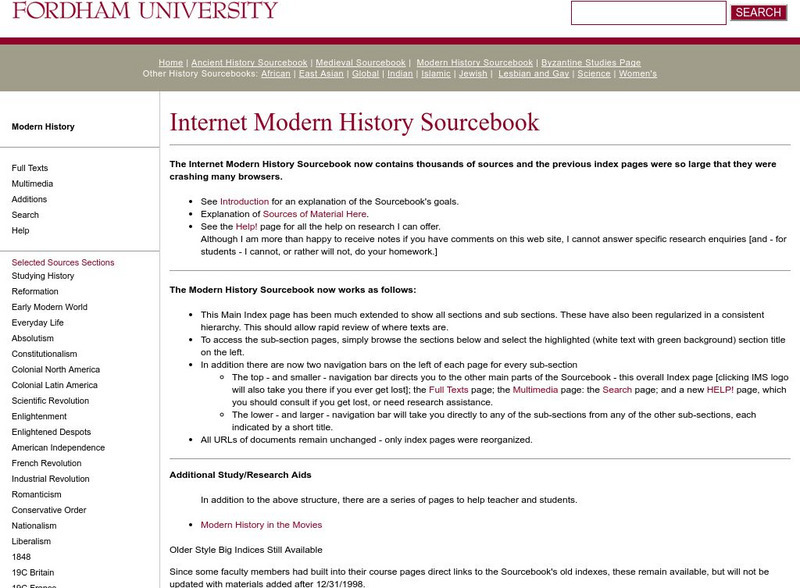Hi, what do you want to do?
Curated OER
The Price to Be Paid For the Next Scientific Revolution
Seventh graders work as advisors to the President evaluating issues like cloning, cryogenics, assisted suicide, etc. They research the Scientific Revolution of the past and the outcome and then put together a plan for the President.
Curated OER
The Scientific Revolution in England and Europe
Students read and discuss Scientific Revolution information sheet and the diagram concerning the causes of the Scientific Revolution. They construct a timeline including Aristotle, Democritus, Copernicus, Bacon and Descartes along with a...
Curated OER
Ptolemy, Copernicus, & the Church
Students explore the scientific revolution. In this scientific revolution instructional activity, students complete activities regarding Ptolemy, Copernicus, and the Church.
Curated OER
The Impact of Cultural Values in EArly Industrial England
Tenth graders analyze works from the period of the Industrial Revolution in England and identify the cultural values depicted and inferred that paved the way for the Industrial Revolution to occur at this time. They create captions that...
Beverly Hills High School
Memoirs of a Legend
To conclude a study of the French Revolution, young historians adopt the voice of critics of Napoleon Bonaparte and lay charges against him. They then craft a memoir in Napoleon's voice that details his motives and what he sees as his...
Curated OER
Galileo Galilei
In this online interactive history quiz worksheet, students respond to 48 multiple choice questions about Galileo Galilei. Students may submit their answers to be scored.
Curated OER
Weather and Climate
It's hot today, but is that the weather or the climate? This colorful presentation isolates both concepts to allow for better understanding by covering the positioning of the planet, making comparisons of land versus water, and looking...
Population Connection
The Peopling of Our Planet
How many people live on the planet, anyway? The first resource in a six-part series covers the topic of the world population. Scholars work in groups to conduct research and make population posters after learning about the global...
Curated OER
Earth in the Solar System
A three-week unit designed to be completed in an elementary level, dual-language immersion classroom, this resource includes several lessons intended to introduce young learners to the solar system, the Earth and how the Earth compares...
National First Ladies' Library
Women's Lives in the Victorian Era
The lives of middle-class Victorian women were circumscribed by strict standards that governed all aspects of behavior. To gain a better understanding of the Victorian Ideals for women, class members research the life of a middle-class...
Teach Engineering
Basically Acids
Base your lesson plan on acids and bases on an informative resource. The first installment of a five-part module on the science behind Harry Potter has individuals investigate acid/base chemistry with the use of invisible inks. They also...
Curated OER
Chinese Inventions A Selected History of Science and Invention in China
Students study the history of Chinese technology by identifying when and where items were invented or discovered.
Curated OER
Who Invented It? When? Chinese Inventions: An Introductory Activity
Learners use Robert Temple's "The Genius of Chins: 3,000 Years of Science, Discovery and Invention", to understand how much the Chinese have contributed with their scientific and technological ability.
Curated OER
Galileo Galilei Questions for Study
In this online interactive philosophy worksheet, students respond to 10 short answer and essay questions about Galileo's contributions to science.
National Wildlife Federation
Why All the Wiggling on the Way Up? CO2 in the Atmosphere
The climate change debate, in the political arena, is currently a hot topic! Learners explore carbon dioxide levels in our atmosphere and what this means for the future in the 11th installment of 12. Through an analysis of carbon dioxide...
Curated OER
Benjamin Franklin - Master of Electricity The Kite Experiment and the Invention of the Lightning Rod
Students study Benjamin Franklin including who he was, what he invented and his experiment. In this inventive lesson plan students follow the steps of Ben Franklin and build a Leyden jar.
Curated OER
Steam Engines
Students investigate the invention of the steam engine. In this technology lesson, students investigate the advancement of technology over time. They relate science and technology together.
Curated OER
Annotated Example of Socratic Questioning: Climate: Global Warming
Students compare and discuss short-term and longer-term global temperature data. They evaluate data from three sets of graphs and then participate in a structured whole class Socratic discussion on the possible causes of climate change.
Curated OER
Reading Trees: Understanding Dendrochronology
Young scholars examine tree-ring dating and discuss the lack of water the settlers in Jamestown faced. They create paper tree rings, simulate rain patterns, and describe the history of construction paper tree sequences.
Curated OER
Perception And The Interpretation of Experiences
Students describe a problem and propose alternative strategies for the solution. They use a model or drawing to visualize the solution to a problem. Students identify alternative factors to be considered when examining possible...
Curated OER
Who was Charles Darwin?
Students trace major developments in the history of evolutionary science. They
discuss the connections between major events in world history and major events in the development of evolutionary thought by creating timelines.
Other
Modern World History: The Industrial Revolution Begins in England (1760 1850)
In this textbook unit, students learn the reasons why the Industrial Revolution took root in England first, and the innovations that made this possible. These included textile inventions such as the flying shuttle and the spinning jenny,...
National High Magnetic Field Laboratory
Magnet Academy: Timeline of Electricity and Magnetism: 1600 1699
The Scientific Revolution takes hold, facilitating the groundbreaking work of luminaries such as William Gilbert, who took the first truly scientific approach to the study of magnetism and electricity and wrote extensively of his findings.
Internet History Sourcebooks Project
Fordham University: Modern History Sourcebook
A rich Fordham University site of primary source material that include full-text, and multimedia sites. There are additional study and research guides such as Modern History in the Movies.




























